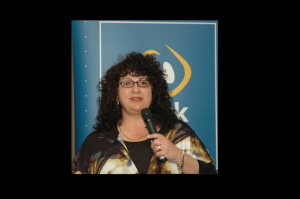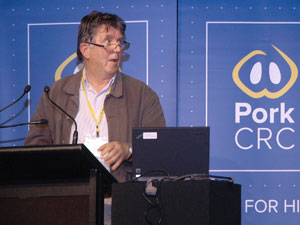Program Leader
Pat Mitchell
Subprogram 2A: Novel disease diagnostics
Subprogram 2B: Healthy robust pig genotypes
Pat migrated to Australia from Malta with her parents and siblings when she was about 18 months old and they settled in Melbourne. She was raised there and decided to do Agricultural Science at University because she wanted to live in the country and hated living in the city.
Despite a less than auspicious start, Pat really enjoyed it, but was a little concerned as she had to do farm practical work as part of the course. She trolled through the Agricultural schools’ list of farmers who didn’t mind students on their farms and decided that it was either going to be pigs or bees.
Pat received a gig on a piggery at Romahill and Mark Mingay gave her what was her first job. After that experience, there was no going back, as she loved the job and really enjoyed working with pigs. Halfway through her Ag course she deferred for two years and worked at Mayfair Farms, (now Rivalea) Huntly, Victoria. Pat went back to University and finished with an honours degree in Agricultural Science. After graduating, she worked in a number of piggeries in Victoria for the next 10 years.
In 1996 Pat was fortunate to receive a Pig Research and Development Corporation PhD scholarship and was based at the Pig Health and Research Unit at Bendigo with DPI. In 2000, after graduating, she spent a year in the USA with the Swine Medicine Group at Purdue University and then returned to DPI.
Since then, she’s worked in Government and Private Industry in research and extension, as well as providing technical advice and support to pork producers. She’s been an R&I Manager at APL for almost five years and a Subprogram leader for subprograms 2A (Novel disease diagnostics) and 2B (Healthy robust pig genotypes) for the CRC for High Integrity Australian Pork. She describes both organisations as very understanding, allowing her to work remotely from the family farm. She’s very excited about Program 2 as the ‘high integrity’ aspect for this program is focusing on improving the health of our animals while reducing on-farm antibiotic use, while providing better diagnostic support to producers and vets. We’re working with some fantastic researchers and will have some very practical production based solutions from this program.
Pat is a member of the Education Committee and the joint APL/Pork CRC team.
With her husband she co-managed the family’s piggery, which, up until recently, was part of his family’s five generation farm. She’s also Vice President of Victorian Farmers Federation (VFF) Pig Group.
Contact details: Dr Pat Mitchell, email Pat.Mitchell@australianpork.com.au
Eric Thornton
Subprogram 2A: Novel disease diagnostics
Subprogram 2C: Replacement of antibiotics with effective integrated health strategies
Diagnostic projects
Diagnostic projects make up the first group of research projects managed by Eric.
One is to quantify the volume of airborne pathogens in a piggery, to indicate the need for corrective action.
A second is to develop a quantitative PCR for Lawsonia IC, the causal agent of ileitis, so that it can be used to determine the point at which the disease begins to adversely affect growth rate and to assess the effectiveness of management applications such as sanitation and vaccination.
A third is to develop a standardised protocol for the recording of antibiotic usage in piggeries. At present there is no satisfactory means of estimating industry use of antibiotics within Australia and having a standard protocol will enable the estimation of industry usage from records submitted by cooperating farms and veterinarians and indicate whether national antibiotic usage is really falling.
Vaccine projects
There are two vaccine projects.
One is to evaluate the best combination of live or killed vaccines against APP (Actinobacillus pleuropneumonia) and concurrently to ascertain if the serological tests available in Australia can be used to determine whether vaccination has been successful in generating an immune response.
The second concerns a live erysipelas vaccine, already available overseas, which can be delivered in water. The Pork CRC is supporting the field trial necessary to convince the APVMA of the vaccine’s efficacy so that it can be registered, as the distributor was unwilling to bear all the costs of the trial in consideration of the small size of the prospective market in Australia.
E coli
Finally, there are nine projects related to control of E coli infections, pre and post-weaning.
Some are nutritional studies aimed at preventing infection and offsetting any loss of growth potential, including some novel agents such as plant extracts & essential oils (PEEOs).
Others are more therapeutic in nature, with projects addressing the use of bacteriophages (viruses of bacteria), anti-inflammatory agents, novel peptides and passive immunisation against Oedema Disease.
Most of these projects commenced in late 2012 and early 2013, so few results are yet available, with most due to be completed by late 2013 or mid 2014.
Eric’s expertise
Eric Thornton spent 16 years in mixed veterinary practice after graduation, mostly as principal of a practice at Corowa, NSW, followed by 16 years as Senior Veterinarian with the company which is now Rivalea Australia. He then resigned to establish his own rural business at Beechworth, North East Victoria. His current involvement with the pig industry is as a member of the APIQ Panel, as a Pork CRC SubProgram Leader and as Chairperson of the Rivalea Animal Ethics Committee.
Contact details: Dr Eric Thornton, email eric.amulet@icloud.com
Read more about Eric’s work by clicking here
First published – APN July 2013





